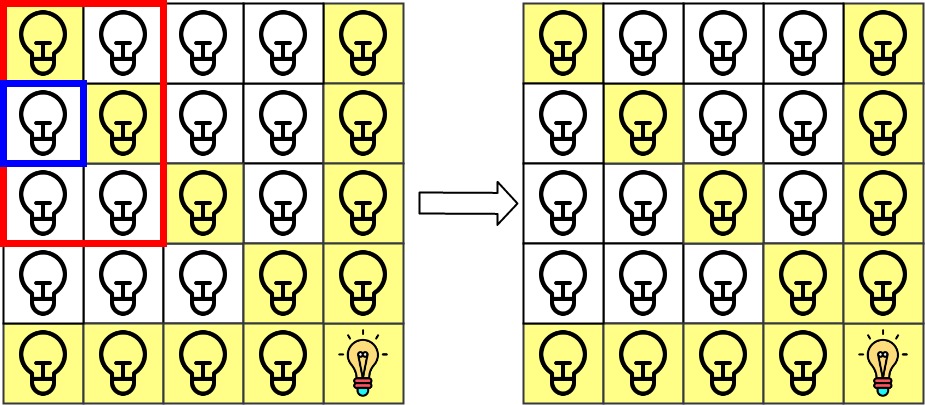1001. Grid Illumination


Description
There is a 2D grid of size n x n where each cell of this grid has a lamp that is initially turned off.
You are given a 2D array of lamp positions lamps, where lamps[i] = [rowi, coli] indicates that the lamp at grid[rowi][coli] is turned on. Even if the same lamp is listed more than once, it is turned on.
When a lamp is turned on, it illuminates its cell and all other cells in the same row, column, or diagonal.
You are also given another 2D array queries, where queries[j] = [rowj, colj]. For the jth query, determine whether grid[rowj][colj] is illuminated or not. After answering the jth query, turn off the lamp at grid[rowj][colj] and its 8 adjacent lamps if they exist. A lamp is adjacent if its cell shares either a side or corner with grid[rowj][colj].
Return an array of integers ans, where ans[j] should be 1 if the cell in the jth query was illuminated, or 0 if the lamp was not.
Example 1:

Input: n = 5, lamps = [[0,0],[4,4]], queries = [[1,1],[1,0]] Output: [1,0] Explanation: We have the initial grid with all lamps turned off. In the above picture we see the grid after turning on the lamp at grid[0][0] then turning on the lamp at grid[4][4]. The 0th query asks if the lamp at grid[1][1] is illuminated or not (the blue square). It is illuminated, so set ans[0] = 1. Then, we turn off all lamps in the red square.The 1st query asks if the lamp at grid[1][0] is illuminated or not (the blue square). It is not illuminated, so set ans[1] = 0. Then, we turn off all lamps in the red rectangle.

Example 2:
Input: n = 5, lamps = [[0,0],[4,4]], queries = [[1,1],[1,1]] Output: [1,1]
Example 3:
Input: n = 5, lamps = [[0,0],[0,4]], queries = [[0,4],[0,1],[1,4]] Output: [1,1,0]
Constraints:
1 <= n <= 1090 <= lamps.length <= 200000 <= queries.length <= 20000lamps[i].length == 20 <= rowi, coli < nqueries[j].length == 20 <= rowj, colj < n
Solution
class Solution:
def gridIllumination(self, n: int, lamps: List[List[int]], queries: List[List[int]]) -> List[int]:
rows, cols, a_diag, d_diag = Counter(), Counter(), Counter(), Counter()
pos = set()
for x, y in lamps:
if (x, y) not in pos:
pos.add((x, y))
rows[x] += 1
cols[y] += 1
a_diag[x + y] += 1
d_diag[x - y] += 1
res = []
for x, y in queries:
if rows[x] > 0 or cols[y] > 0 or a_diag[x + y] > 0 or d_diag[x - y] > 0:
res.append(1)
for dx in range(x - 1, x + 2):
for dy in range(y - 1, y + 2):
if (dx, dy) in pos:
pos.remove((dx, dy))
rows[dx] -= 1
cols[dy] -= 1
a_diag[dx + dy] -= 1
d_diag[dx - dy] -= 1
else:
res.append(0)
return res